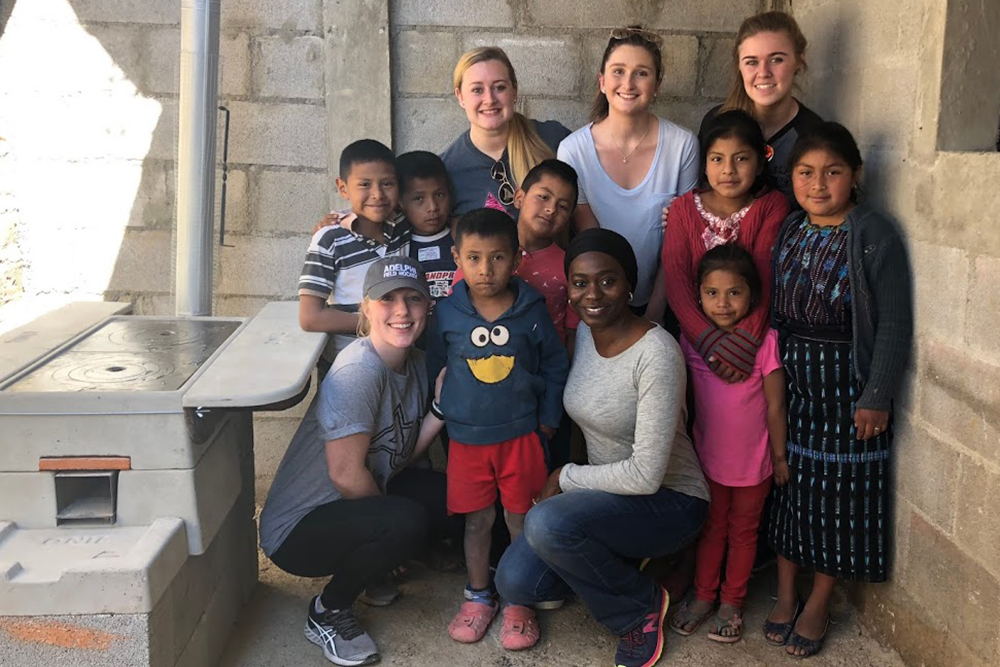Korede Adegoke, Ph.D., began her professional career as a physician in her home country of Nigeria, committed to the treatment of pregnant women and their children. Dismayed by the preventable deaths she witnessed almost daily, she eventually came to the conclusion that the best way to help improve health among vulnerable populations would be to go into public health research and teaching.
Korede Adegoke, Ph.D., began her professional career as a physician in her home country of Nigeria, committed to the treatment of pregnant women and their children. Dismayed by the preventable deaths she witnessed almost daily, she eventually came to the conclusion that the best way to help improve health among vulnerable populations would be to go into public health research and teaching.
Now, after earning a master’s degree in public health and a Ph.D. in epidemiology at American universities, she’s an assistant professor at Adelphi’s College of Nursing and Public Health, conducting studies that may lead to changes in the care provided women and children in low-income groups and underserved communities. She actively involves Adelphi students in her research, inspiring them to enter the field.
In just the past two years, Dr. Adegoke has published articles about health insurance and access to skilled birth attendance in Togo, trends in reproductive health in Nigeria, the effects of childhood social and family support on mental health in adulthood, and colorectal cancer screening among vulnerable populations in Florida. Another paper, which updates research she conducted for her doctoral dissertation, is pending publication; it provides further data on the effect of folic acid supplements on the fetal growth of babies born in the United States to mothers who smoke.
“A lot has been done in the U.S. to make sure pregnant women quit smoking, but these interventions are not always effective,” she said. “I’m hoping this work will initiate more conversations about increasing folic dosage to improve birth outcomes for mothers who smoke.”
Dr. Adegoke is also working on identifying subgroups of women in Nigeria who are vulnerable to intimate partner violence, striving to develop interventions to reduce its occurrence. Her research has identified risk factors, such as witnessing intimate partner violence between parents as a child. It has also outlined measures that can be put in place to reduce women’s risk and improve access to care.
“By closely studying high-risk women, we will identify ways to reduce their risk and improve access to resources and services,” she explained.
At the same time, Dr. Adegoke teaches graduate courses in epidemiology and quantitative analysis, enhancing her classes with real-life examples and hands-on experiences.
“I put effort into identifying and utilizing up-to-date resources and technology in the classroom,” she says. “It is my goal to ensure that my students, irrespective of their learning styles, achieve the required competencies for the class and can apply concepts learned in real life and in their future career.”
Last January, Dr. Adegoke took about a dozen students to Guatemala, where lower respiratory infections are a leading cause of death. One of the reasons these infections are common is that many poor, indigenous Guatemalans cook over open fires, sometimes very close to their living area, and inhale a great deal of smoke. A solution is to install simple wood-burning stoves in homes, which is something the Adelphi group did during their trip.
“Just knowing how happy and appreciative the families were made the students want to keep installing the stoves all day,” Dr. Adegoke said.
Students also provided lunch to elderly people and visited a recycling plant to explore ways to help the people reduce water pollution. They donated educational and medical supplies. They also became aware of the cultural differences between indigenous Mayans and ladinos, or nonindigenous Guatemalans, and the socioeconomic disparities that lead to unequal access to education and healthcare.
“We have a very diverse master of public health program at Adelphi, with many international studies,” she said. “We encourage a global perspective that extends beyond the classroom and inspires future work that could help solve some of these pressing world issues.”
For further information, please contact:
Todd Wilson
Strategic Communications Director
p – 516.237.8634
e – twilson@adelphi.edu
